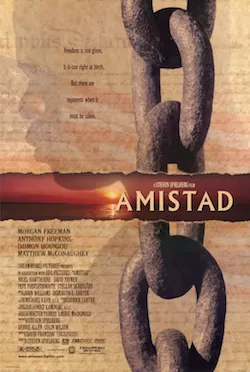Historical accuracy of Amistad

Historical accuracy of Amistad

Characters
Cinque
Cinque was a real leader of the Mende captives who revolted on the Amistad. The film accurately portrays his strength and determination in fighting for his freedom.
John Quincy Adams
John Quincy Adams was a real former U.S. President who argued the Amistad case before the Supreme Court. The film depicts his role accurately, including his arguments based on natural law and human rights.
Roger Sherman Baldwin
Roger Sherman Baldwin was a real lawyer who defended the Amistad captives. The film accurately depicts his efforts in the legal battle.
Theodore Joadson
Theodore Joadson was a real person who played a key role in translating for the Mende-speaking captives and helping them communicate their story.
Judge Coglin
While Judge Coglin is a somewhat composite character, he represents the various judges who presided over the Amistad cases. The film accurately depicts the legal proceedings and the challenges faced by the captives in the American court system.
President Van Buren's portrayal
The film portrays President Martin Van Buren as primarily concerned with political expediency, which may be an oversimplification of his motivations.
Story
1839 slave revolt
The film depicts the historical revolt aboard the Spanish slave ship La Amistad, where enslaved Africans, led by Sengbe Pieh (Joseph Cinqué), seized control.
Landing in Long Island
The Amistad was eventually captured off the coast of Long Island, New York, leading to the legal battle for the freedom of the enslaved people.
Legal battle for freedom
The film portrays the complex legal proceedings, including the involvement of abolitionists, the Spanish government's claim, and the U.S. government's position.
Supreme Court ruling
The Supreme Court ruled in favor of the Amistad captives, granting them their freedom and the right to return to Africa.
Cinqué's leadership
The film portrays Cinqué as a courageous and determined leader, which aligns with historical accounts.
Abolitionist movement
The film highlights the efforts of abolitionists like Lewis Tappan and Roger Baldwin in advocating for the Amistad captives.
Spanish claim
The Spanish government claimed ownership of the Amistad and its cargo, including the enslaved Africans.
Courtroom drama
The film effectively captures the tension and drama of the courtroom scenes, highlighting the legal arguments and moral dilemmas.
Moral complexities
The film explores the moral complexities of slavery and the legal system's struggle to reconcile property rights with human rights.
Return to Africa
While some of the Amistad captives did return to Africa, the film simplifies the challenges and complexities of their repatriation.
Language barrier
The film highlights the initial communication difficulties between the Mende-speaking captives and the Americans.
Cultural differences
The film portrays the cultural differences between the Africans and the Americans, including their contrasting views on freedom and justice.
